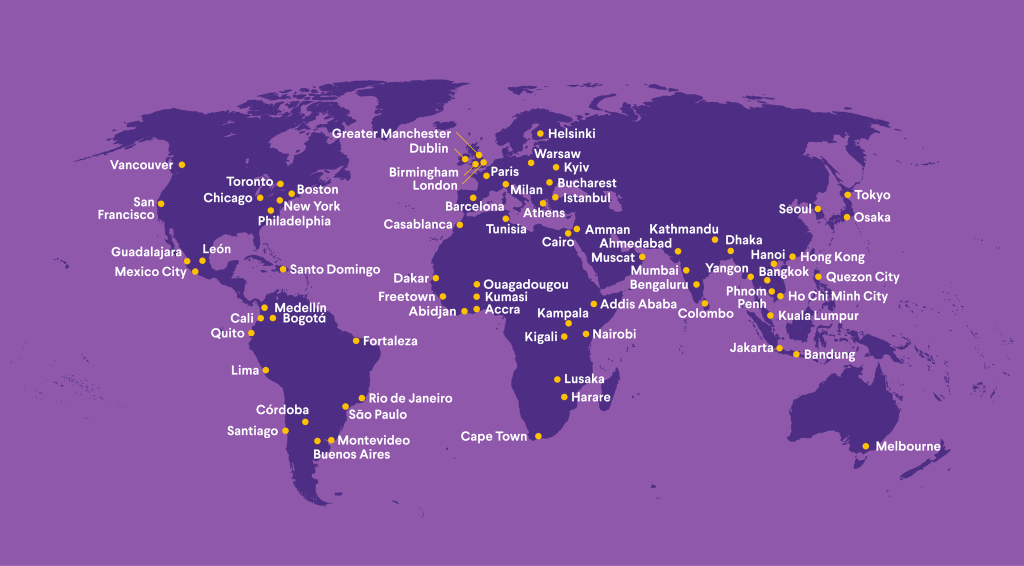Partnership for Healthy Cities
Each year, 45 million people die from noncommunicable diseases (NCDs) — including cardiovascular disease, cancer, diabetes, and chronic respiratory diseases — and injuries. The majority of these deaths occur in low- and middle-income countries. A major focus of Bloomberg Philanthropies’ public health work is forestalling these unnecessary deaths and injuries.
Noncommunicable diseases account for 77% of deaths in low- and middle-income countries, but only 2% of global health funding addresses them.
In 2017, as part of his role as the World Health Organization Global Ambassador for Noncommunicable Diseases and Injuries, Mike Bloomberg launched the Partnership for Healthy Cities, in partnership with the World Health Organization and Vital Strategies. Cities are now home to over half of the world’s population, and city leaders are uniquely positioned to drive policies and programs to help transform public health.
The partnership brings together 74 cities that have agreed to implement at least one proven policy to fight NCDs and injuries, increase awareness, and share best practices. More than 300 million people in these cities are living healthier, safer lives as a result of policies and programs supported through the Partnership for Healthy Cities.
The annual Partnership for Healthy Cities Summit, held in London in 2023 and Cape Town in 2024, convenes local leaders to discuss proven interventions to prevent noncommunicable diseases (NCDs) and injuries, and the best practices that save lives and create healthier cities.
Map
74 Cities Committed to the Partnership for Healthy Cities

Proven Interventions
The Partnership for Healthy Cities supports 14 proven health interventions to prevent noncommunicable diseases and injuries:
- Create a smoke-free city: Introduce, pass, and enforce legislation and regulations to make all indoor public places, workplaces, and public transport 100% smoke-free.
- Ban tobacco advertising: Introduce, pass, and enforce legislation and regulations establishing comprehensive bans on tobacco advertising, promotion, and sponsorship, including a ban of display at the point-of-sale.
- Raise tobacco taxes and levies/fees: Increase excise taxes and prices on tobacco; increase subnational tobacco tax revenue.
- Tax sugary drinks: Adopt, implement, and enforce effective taxation of sugary beverages.
- Set nutrition standards for foods served and sold in public institutions: Adopt, implement, and enforce nutrition standards in public settings (e.g., schools, hospitals, and childcare sites).
- Regulate food and drink marketing: Adopt, implement, and enforce restrictions on marketing sugary drinks and/or unhealthy foods.
- Create healthier restaurant environments: Adopt, implement, and enforce food-service policies (e.g., calorie labeling, sodium labeling, trans-fat ban).
- Reduce speeding: Enhance and/or enforce speed limit laws/regulations; implement road designs that reduce speed and protect pedestrians.
- Increase motorcycle helmet use: Enhance and/or enforce laws mandating compulsory use of helmets while riding 2-wheelers.
- Reduce drinking and driving: Enhance and/or enforce traffic laws related to drinking and driving.
- Increase seat belt use: Enhance and/or enforce laws mandating compulsory seat-belt use.
- Promote active mobility: Increase cycling via bike share programs and/or street design; implement Safe Routes to Schools.
- Prevent opioid-associated overdose deaths: Establish naloxone distribution programs or establish community-based harm reduction services (e.g., syringe exchange, drop-in center).
- Enhance public health data and monitoring systems: Conduct a population-based survey of risk factors for NCDs and injuries; conduct targeted air monitoring to identify important emissions sources and their impact on ambient air quality and health.
Videos
Featured Cities from the Partnership for Healthy Cities

To access a wealth of tools and resources to support NCD and injury prevention, visit the Cities for Health website.
Top photo: Students in Bogotá, Colombia benefit from the city’s participation in the Partnership for Healthy Cities as it implements policies to encourage healthy eating.





